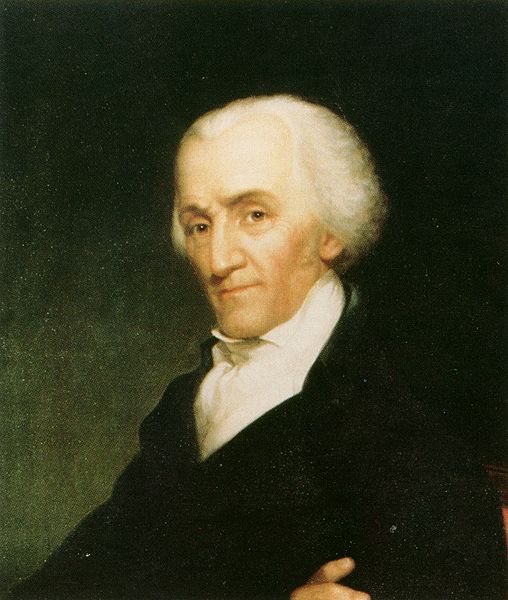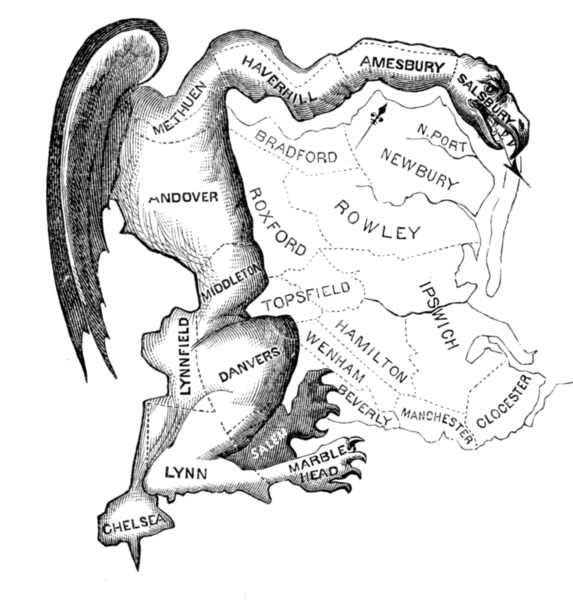<Back to Index>
- Physicist Gordon Gould, 1920
- Painter Hippolyte Delaroche, 1797
- 5th Vice President of the United States Elbridge Thomas Gerry, 1744
PAGE SPONSOR


Elbridge Thomas Gerry (July 17, 1744 – November 23, 1814) was an American statesman and diplomat. As a Democratic - Republican he was selected as the fifth Vice President of the United States, serving under James Madison, from March 4, 1813, until his death a year and a half later. He was the first Vice President not to run for President of the United States, although this was due to his death rather than being a political decision.
Gerry was one of the signers of the Declaration of Independence and the Articles of Confederation. He was one of three men who refused to sign the Constitution because it did not then include a Bill of Rights. Gerry later became the ninth Governor of Massachusetts. He is known best for being the namesake of gerrymandering, a process by which electoral districts are drawn with the aim of aiding the party in power, although its initial ‹g› has softened to /dʒ/ from the hard /ɡ/ of his name.
Born in Marblehead, Massachusetts, the third of twelve children, he was a graduate of Harvard College,
where he studied to be a doctor, attending there from age fourteen. He
worked in his father's shipping business and came to prominence over
his opposition to commerce taxes. He was elected to the General Court
of the province of Massachusetts in May 1772 on an anti-British platform. Gerry was a Massachusetts delegate to the Continental Congress from
February 1776 to 1780. He also served from 1783 to September 1785 and
was married in 1786 to Ann Thompson, the daughter of a wealthy New York
merchant, 21 years his junior. In 1787 he attended the United States Constitutional Convention and was one of the delegates voting against the new constitution (joining George Mason and Edmund Randolph in not signing it). He was elected to the U.S. House under the new national government, and served in Congress from 1789 to 1793. He surprised his friends by becoming a strong supporter of the new government, and so vigorously supported Alexander Hamilton's reports on public credit, including the assumption of state debts, and supported Hamilton's new Bank of the United States, that he was considered a leading champion by the Federalists. He did not stand for reelection in 1792. He was a presidential elector for John Adams in the 1796 election, and was appointed by Adams to the critical delegation to France that was humiliated by the French in the XYZ Affair.
He stayed in France after his two colleagues returned, and Federalists
accused him of supporting the French. He returned in October 1798, and
switched his affiliation to the Democratic - Republican Party in 1800. He
was the unsuccessful Democratic - Republican nominee for governor of
Massachusetts in 1800, 1801, 1802 and 1803. In 1810 he was finally
elected Governor of Massachusetts as
a Democratic - Republican. He was re-elected in 1811 but defeated in 1812
over his support for the redistricting bill that created the word gerrymander. He was chosen as vice president to James Madison. He died in office of heart failure in Washington, D.C. and is buried there in the Congressional Cemetery. Gerry's grandson, Elbridge Gerry (1813 – 1886), was a Member of the U.S. House of Representatives from Maine; his great-grandson, Peter G. Gerry, was a Member of the U.S. House of Representatives and United States Senator from Rhode Island. In
1812 the word "gerrymander" was coined when the Massachusetts
legislature redrew the boundaries of state legislative districts to
favor Governor Gerry's party. The Governor's strategy was to encompass
most of the state's Federalists, allowing them to win in that district
while his party, the Democratic - Republicans, took control of all the
other districts in the state. The term eventually became part of world
political vocabulary, and the practice is still in use today. The upstate New York town of Elbridge, sitting just west of Syracuse, with a population of roughly 6,000 is named in his honor, as is the western New York town of Gerry, in Chautauqua County, between Buffalo and Jamestown, with a population of about 2,000.